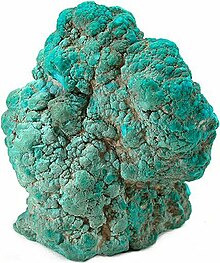
Back Turkoois (mineraal) Afrikaans Turquesa (mineral) AN فيروز (حجر كريم) Arabic فيروز (حجر كريم) ARZ Firuzə (mineral) Azerbaijani فیروزه AZB Фирүзә Bashkir Біруза Byelorussian Тюркоаз Bulgarian ফিরোজা Bengali/Bangla
This article needs additional citations for verification. (June 2022) |
| Turquoise | |
|---|---|
 | |
| General | |
| Category | Phosphate minerals |
| Formula (repeating unit) | CuAl6(PO4)4(OH)8·4H2O |
| IMA symbol | Tqu[1] |
| Strunz classification | 8.DD.15 |
| Crystal system | Triclinic |
| Crystal class | Pinacoidal (1) (same H–M symbol) |
| Identification | |
| Colour | Turquoise, blue, blue-green, green |
| Crystal habit | Massive, nodular |
| Cleavage | Perfect on {001}, good on {010}, but cleavage rarely seen |
| Fracture | Conchoidal |
| Mohs scale hardness | 5–6 |
| Luster | Waxy to subvitreous |
| Streak | Bluish white |
| Diaphaneity | Opaque |
| Specific gravity | 2.6–2.9 |
| Optical properties | Biaxial (+) |
| Refractive index | nα = 1.610 nβ = 1.615 nγ = 1.650 |
| Birefringence | +0.040 |
| Pleochroism | Weak |
| Fusibility | Fusible in heated HCl |
| Solubility | Soluble in HCl |
| References | [2][3][4] |
Turquoise is an opaque, blue-to-green mineral that is a hydrous phosphate of copper and aluminium, with the chemical formula CuAl6(PO4)4(OH)8·4H2O. It is rare and valuable in finer grades and has been prized as a gemstone for millennia due to its hue.
Like most other opaque gems, turquoise has been devalued by the introduction of treatments, imitations, and synthetics into the market. The robin egg blue or sky blue color of the Persian turquoise mined near the modern city of Nishapur, Iran, has been used as a guiding reference for evaluating turquoise quality.[5]
- ^ Warr, L. N. (2021). "IMA–CNMNC approved mineral symbols". Mineralogical Magazine. 85 (3): 291–320. Bibcode:2021MinM...85..291W. doi:10.1180/mgm.2021.43. S2CID 235729616.
- ^ Hurlbut, Cornelius S.; Klein, Cornelis (1985). Manual of Mineralogy (20th ed.). New York: John Wiley & Sons. ISBN 978-0-471-80580-9.
- ^ "Turquoise". Mindat.org. Retrieved 2006-10-04.. "Turquoise: Turquoise mineral information and data". Archived from the original on 2006-11-12. Retrieved 2006-10-04.
{{cite web}}: CS1 maint: bot: original URL status unknown (link). - ^ Anthony, John W.; Bideaux, Richard A.; Bladh, Kenneth W.; Nichols, Monte C., eds. (2000). "Turquoise" (PDF). Handbook of Mineralogy. Vol. IV. Chantilly, Virginia: Mineralogical Society of America. ISBN 978-0-9622097-3-4. Archived (PDF) from the original on 2012-02-11.
- ^ "Turquoise Quality Factors". Gemological Institute of America.